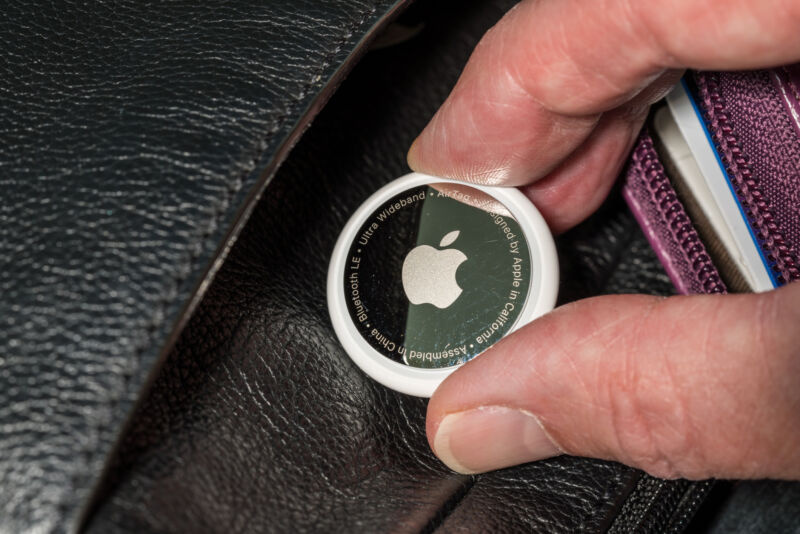
This month, more than three dozen victims allegedly terrorized by stalkers using Apple AirTags have joined a class-action lawsuit filed in a California court last December against Apple. They alleged in an amended complaint that, partly due to Apple’s negligence, AirTags have become “one of the most dangerous and frightening technologies employed by stalkers” because they can be easily, cheaply, and covertly used to determine “real-time location information to track victims.”
Since the lawsuit was initially filed in 2022, plaintiffs have alleged that there has been an “explosion of reporting” showing that AirTags are frequently being used for stalking, including a spike in international AirTags stalking cases and more than 150 police reports in the US as of April 2022. More recently, there were 19 AirTags stalking cases in one US metropolitan area—Tulsa, Oklahoma—alone, the complaint said.
This seeming escalation is concerning, plaintiffs say, because Apple allegedly has not done enough to mitigate harms, and AirTags stalking can lead to financial ruin, as victims bear significant costs like hiring mechanics to strip their cars to locate AirTags or repeatedly relocating their homes. AirTags stalking can also end in violence, including murder, plaintiffs alleged, and the problem is likely bigger than anyone knows, because stalking is historically underreported.
“Consequences have been as severe as possible: multiple murders have occurred in which the murderer used an AirTag to track the victim,” their complaint alleged. One plaintiff from Indiana, LaPrecia Sanders, lost her son after his girlfriend allegedly used an AirTag to track his movements and then “followed him to a bar and ran him over with her car, killing him at the scene.”
Most of the plaintiffs reside in the US, alleging significant costs and harms incurred from alleged AirTags stalking in 20 states. Two plaintiffs reside in Canada—including a recent high school graduate—and one plaintiff currently lives in Ireland. Many report that stalkers using AirTags are abusive partners or exes—hiding AirTags in linings of purses, car wheel wells, or even stitched inside a child’s teddy bear—but others report being stalked by a “mystery person” with unknown motives.
According to their complaint, tracker technologies like AirTags—which are designed to help people locate lost or stolen items—”allow stalkers to follow their victims’ movements in real time and to undo any attempt on the part of the victim to evade or hide from the stalker.” Plaintiffs claimed that AirTags are among products that have “revolutionized the scope, breadth, and ease of location-based stalking” because every Apple device is part of the company’s expansive tracking network that’s being abused by stalkers.
“What separates the AirTag from any competitor product is its unparalleled accuracy, ease of use (it fits seamlessly into Apple’s existing suite of products), and affordability,” their complaint said. “With a price point of just $29, it has become the weapon of choice of stalkers and abusers.”
Victims suing alleged that Apple knew that AirTags could be used by stalkers but advertised them as “stalker-proof” anyway. Then, when its “stalker-proof” protections were “exposed as totally inadequate,” Apple had to scramble for the past two and a half years to “address its failures in protecting people from unwanted, dangerous tracking,” their complaint said.
Despite Apple’s steps to enhance safety features—including adding iOS alerts when AirTags are nearby, chimes installed in AirTags that help victims detect and locate hidden AirTags, and an app called “Tracker Detect” that victims with Android phones can use to scan for AirTags—plaintiffs have alleged that AirTags remain dangerous.
One plaintiff, Georgia resident Brittany Alowonle, reported that she and her daughter were being stalked by someone using AirTags within the past two weeks “without knowing by whom or why.” Although she cannot locate the AirTags, she receives daily alerts from Apple and chimes from the AirTags that confirm that the AirTags are still there. These chimes, to Alowonle, only signal that she’s being perpetually watched.
“Every day, I am reminded that me and my daughter are not safe,” Alowonle said in the complaint, which noted, “if one’s location is constantly being transmitted to an abuser, there is no place to run.”
One Irish national, Àine O’Neill, had been living in California while launching a Hollywood career that was just taking off when she found AirTags inexplicably being used to monitor her every move. She gave up her career and moved back to Ireland, feeling that she had “no way of revealing the identity of her stalker or properly gauging the level of danger she was in.”
“While she is now 5,157 miles away from her unknown stalker, she is that same distance away from her lifelong dream,” the complaint said.
Victims have alleged that Apple’s acts and practices violate federal and state laws, claiming that Apple negligently released a defective product and was unjustly enriched while invading the privacy of every victim unwittingly being tracked on its expansive network of devices. They’ve asked the court to award damages to all persons in the US who own iOS or Android devices, which includes classes of users who were stalked, as well as those who were allegedly at risk of stalking. They also seek a court order “enjoining Apple from further unlawful, unfair, and/or fraudulent practices with respect to the design, manufacture, and release into the market of its AirTags.”
Apple did not respond to Ars’ request to comment. Court filings show that Apple is expected to move to dismiss the lawsuit by October 27, when the company is required to respond to the amended complaint.








